- Home
- Alan Campbell
Scar Night Page 2
Scar Night Read online
Page 2
The figure hovered for a while, the shadow of its cowl reaching like a talon over the temple’s steeply canted roofs. Then the figure lowered the lantern and moved away.
Dill watched the priest’s shadow flit over the glass before the same window went dark. A hundred heartbeats passed while he clung there shivering. How long had the priest been there? What had he seen? Had he just then happened to pass by, or had he been hiding there in the room, waiting, watching, spying ?
And would he inform on Dill?
The tracery of scars on Dill’s back suggested he certainly might.
I didn’t fly. I wasn’t going to fly. He’d only unfurled his wings to feel the wind. That was all. That wasn’t forbidden.
Still shaking, Dill climbed down from the weathervane and squatted where the moss-covered cone capped the surrounding slates. At once there seemed to be watchers hovering at every window, hooded faces scrutinizing him from all around, unseen lips whispering lies that would find their way back to the Presbyter himself. Dill felt blood rise in his cheeks. He tore free a scrap of moss and feigned interest in it, scrunching it in his palm without feeling it, examining it without seeing it. As he let it go, the wind snatched it and carried it out over Deepgate.
It was said that once, you could have stood on the lip of the abyss and peered into the darkness below the city with nothing but the foundation chains between you and the fathomless depths. A sightglass, perhaps, might have offered views of the ghosts far below—but not now. The great chains were still down there, somewhere, hidden beneath the city that a hundred generations of pilgrims had built. But time had seen cross-chains, cables, ropes, girders, struts, and beams grow like roots through those ancient links. Buildings had been raised or hung, bridges and walkways suspended, until Deepgate had smothered its own foundations.
Dill lifted one calloused foot and thumped it down. A slate shattered under his heel. He picked up a fist-sized chunk of it and swung his arm to throw it at the window. But he stopped in time. The windows were old, maybe even as old as the temple and the foundation chains. As old as the roof tile he’d just broken, he thought miserably. Instead he hurled the slate into the sunset and listened hard to hear whether it hit anything before falling into the abyss beneath the city.
Glass shattered in the distance.
He flopped back, not caring if he crushed his feathers, and gazed past the twinkling streets to where the Deadsands stretched like rumpled silk to the horizon. Purple thunderheads towered in the west, limned in gold. To the east, the Dawn Pipes snaked into the desert, and there a ripple of silver in the sky caught his attention. He sat up.
An airship was purging its ribs for descent, venting hot air from the fabric strips around the liftgas envelope. Turning as it descended, it lumbered toward the Deepgate shipyards, abandoning the caravan it had escorted in from the river towns. The caravan threaded its way between water and waste pipes, the camels trailing plumes of sand. Behind the merchants, a line of pilgrims shuffled in their shackles between two ranks of mounted missionary guards.
“See you tomorrow,” Dill murmured, but he didn’t really imagine he would. It would be days before the pilgrims died.
Darkness was creeping into the sky now, pierced by the first evening stars, and so he slid the rest of the way down the roof, hitting the gutter with a thump and a tussle of feathers. A rotting trellis, overgrown with ivy, formed a rustling, snapping ladder back down to his balcony. When his feet finally found solid stone, he was shaking more than ever.
Once inside, he closed all four of the bolts in the balcony door, then checked the window, making sure both locks were also tight. The fire was uneasily low, and deep shadows lurked at the edges of his room. Dill piled on more coals, then knelt before the hearth, prodding them with a poker. The fire snapped and popped and sparkled briefly, billowing heat. Orange embers spiralled up the flue; coals crumbled and settled. He tapped the poker against the iron-toothed fender, and hung it back on its hook. Then he took an armful of the big temple candles from their chest and circled his cell, lighting each with a taper from the fire before pressing it down on yesterday’s melted stub, where it would best keep the night at bay.
When he was satisfied, he looked up to the wall above the mantle, to the sword.
His sword.
He raced over to the weapon and slid it free from its mount. His soot-smeared fingers barely managed to close around the leather-bound hilt, but that didn’t worry him. Tomorrow he would wear it, all the same. Firelight washed over the curved hand guard and blade. He dipped the sword and raised it again, measuring the solid weight of it. It was still too big for him, too heavy, but he took a step back, thrust forward the blade, and raised his other hand the way all great swordsmen supposedly did. His nightshirt sleeve slipped down to his elbow. The sword tip wobbled.
It took a moment to muster his grimmest expression. He covered his uneven teeth with his lip, thrust out his chin, and spread his wings.
“Are you afraid?” he asked the wall.
His brow furrowed as he swished the sword through the air, once, twice.
“Do you fear this weapon? Or its wielder?” He arched an eyebrow. “My name?” He snorted, rubbed a sooty hand on his nightshirt. “That doesn’t matter. I’m an archon of the Church of Ulcis, Warden to the Hoarder of Souls.” He hesitated, thinking. “And mortal blood of his Herald, Callis.”
That sounded right.
In his mind’s eye, an army of heathens advanced, sword hilts drumming on their shields. They cried out in voices edged with fear:
One archon against a hundred warriors.
“A hundred?” Dill laughed. “No wonder you tremble.” With a twist of his wrist, he spun the sword end over end like a propeller—
—and caught it by the wrong side of the guard, on the sharp side.
“Balls on a skillet!”
The weapon clattered to the floor. A chip flew from the tile where the hilt struck, but the mark was tiny, barely noticeable among all the others.
Dill sucked his finger, then examined it. The scratch, like all the previous ones, wasn’t serious. For the priests had neglected to sharpen the blade in his lifetime—and Dill knew why. He picked up the sword, slammed it back into its wall mount, and dropped to his haunches before the hearth.
Mortal blood of his Herald, Callis.
This time he resolved not to look up at the sword, not as much as a glance. He wrapped his arms around his knees and rocked backwards and forwards, gazing into the warm currents between the coals, brooding.
Darkness gathered outside his cell. The wind picked up, whispered behind the windows, and teased the flames in the hearth. Only once did Dill’s eyes flick back to the sword. He grimaced, hugged his knees tighter.
Tomorrow he would wear it….
Dill cursed, then rose and yanked the sword free again. He’d owned the weapon for six years now, almost half his life. He ought to be able to use it by now. The priests had said he’d grow into it. It was a good sword, they’d said. He wheeled about, snapped his wings out, and addressed the wall once more. “Are you afraid?”
This time there was no army of heathens: nothing but the cold temple stones between Dill and the night sky. He swung the sword backwards and forwards in fierce arcs. “Are you afraid?” Slash. “Are you afraid?” Cut. “Are you afraid?”
He leapt, stabbed the sword into the wall. The tip of the blade sank an inch deep between the stones. Mortar crumbled. The hand guard jarred against his fist. Wincing, he dropped the weapon again.
Dill squeezed his stinging hand under his armpit, and folded to his knees beside the fallen sword. “Why are you afraid?” he asked himself.
Why was he afraid? Temple service was a privilege, an honour, Soul Warden a position of respect. Hadn’t his ancestors performed this duty? His father, Gaine? But they’d been Battle-archons, they’d trained with the Spine, flown far across the surrounding Deadsands on behalf of the temple. They’d warred against the Heshette and carved the wi
ll of Ulcis into heathen strongholds. While Dill himself…
Dill lifted the sword in both grubby hands.
Who am I? An angel who reads about the exploits of his ancestors in books, who stands on his balcony day after day watching the airships return from the river towns, the Coyle delta, the bandit settlements where Battle-archons once fought and died.
Places he would never see. Now churchships and warships ploughed the skies, and an angel’s place was here in Deepgate among the chains. While his father’s armour rusted in a locked storeroom deep in the heart of the temple, ivy had grown unchecked around Dill’s spire. Dust had thickened the old stained-glass windows. Now spiders lived among the jumble of rafters high above his cell, softened the wood with their cobwebs. Now damp crept up the stairwell and saturated the rooms below, all of them empty but for mould and snails.
Dill had been born too late .
But they’d still given him a sword. That meant something. Didn’t it?
A hammering at the door startled him. Dill scrambled to his feet, replaced the sword in its mount, then brushed soot stains deeper into his crumpled nightshirt and padded over to open the door.
Presbyter Sypes stood wheezing on the landing. A black cassock engulfed the old priest, and melted down the spiral stairwell behind him. Only his head and hands were visible: the head shaking like a bone loose in its socket; the hands grinding his walking stick into the stones. “Nine hundred and eleven steps,” he said. “I counted.”
For a moment Dill just stared at him. Then he stammered, “Your Grace, I didn’t expect…I mean, I thought…”
“No doubt,” the Presbyter growled. “I seem to have been climbing up here since breakfast.” He hobbled into the cell, dragging his robes, scowling. “So this is where all the temple candles get to. Place looks like the Sanctum itself. Your clothes”—he handed Dill a rumpled bundle tied with string—“but you’ll need to fold them again. I dropped them, twice.”
“Please, sit down, Your Grace.” Dill scraped a stool closer to the fire.
The Presbyter eyed the tiny stool. “A terminal manoeuvre, I suspect. My bones are still climbing steps. No, I’ll rest here by the window until they realize I’ve finally arrived.” He gathered the folds of his cassock and perched on the window ledge, folding his hands over the silver pommel of his walking stick.
“Well,” he said.
Dill fumbled with the bundle against his chest.
“I said, well?”
Dill hesitated. “I’m looking forward to it,” he said, lowering his eyes.
“Are you really?”
Dill nodded.
“Not nervous?”
Dill shook his head.
“Really?” The old man’s eyes narrowed. “Good.”
A long moment of silence passed between them. Coals shifted in the fire. Dill glanced back up. His sword was still there, glinting in the candlelight.
“Callis’s own sword,” the Presbyter observed.
Dill gave the weapon another brief look. His head dropped even lower as he turned back.
The Presbyter’s gaze travelled round the cell, lingering on the cracked tiles, Dill’s stool, the candle-chest, snail-bucket, and sleeping mat. There was little else to snag anyone’s attention. His hands twisted on the top of the walking stick. “Well—”
“Thank you,” Dill interrupted, “for bringing my clothes.”
Presbyter Sypes coughed. “I was coming up anyway, on my way to the observatory. Thought I’d wish you luck for the big day.”
Dill’s cell wasn’t on the way to the observatory. It wasn’t on the way to anywhere.
“Thank you, Your Grace.”
“Not nervous?”
“No.”
The Presbyter chewed his lips, struggling with something. Finally he said, “Been up on the roof again, have you?”
Dill flinched. “I…”
“Certain priests have nothing better to do than spy and snipe.” The Presbyter’s entire face wrinkled. “I won’t name names.” The wrinkles deepened. “It was Borelock, that bloodless pickthank. Skulking in the shadows like a damn Shettie saboteur, watching everything, as if it were any of his business. At least he came to me this time….” His voice trailed off.
“Still,” the old man added eventually, “can’t say I approve. Parts of the temple roof are rotten through.” He rapped his stick against the window ledge. “Dangerous. Don’t want you falling off and breaking your neck.”
Dill stole a glance at the Presbyter but saw no trace of insincerity there. “It won’t happen again,” he said, and right then he meant it. The whip scars on his back tightened, reminding him that Borelock hadn’t always taken his discoveries to the Presbyter.
Presbyter Sypes was examining the window ledge, as if he expected the stone to crumble at any moment. “Just be careful,” he said. “The temple is no place for foolish mistakes. Dangerous, you understand?”
A gust of wind shook the window glass in its lead surrounds, howled in the chimney. The fire crackled, wavered. Candles guttered. Dill felt the night outside crowding in on them, a pressure behind the windows, pushing, searching for a way in. He swallowed, nodded quickly.
The Presbyter sucked in his cheeks, then let them slacken. “I’d better be off,” he grumbled. “Far too much paperwork for me to be wasting my time here.” He rose unsteadily, his eyes focused inwardly on whatever toils lay ahead of him. “Power shifts among the nobles,” he muttered. “Trade, sciences, censuses, accounts, everything from supplies to bills to taxes to wages to stories to recipes to…hah!…poetry.” His shoulders slumped. “It never ends. The Codex grows fatter, the pillars in the temple library are full of books, stuffed to bursting, and I’m buried under the pages yet to be squeezed in. No place to put it all. How long does it take to build a new storage pillar, eh? Stonemason’s been at it for months now, for months.” He glanced around. “You haven’t seen him, have you? The stonemason?”
“No, Your Grace.”
“Thought not. I think the fellow’s died. Or gone and thrown himself into the abyss.” He sighed. “The fools still do that, you know? One whiff of hard work and they jump, disappear, slip down between the chains like heathens. As if Ulcis would accept unblessed corpses!” The Presbyter rubbed his eyes. “I don’t know, Dill. I don’t know where it will end.”
It seemed to Dill that Presbyter Sypes was ageing ten years for every one that passed. His fingers were wasted, ink-stained, curled into claws, as though still clutching his quill. But the Presbyter would struggle on, year after year, collating, ordering, and binding the city records, filling the pillars in his library with books that no one would ever read.
Until it finally kills him.
Back hunched, the old priest shuffled across the cell. “God help me,” he said, “if I spot him down there, plotting with the dead, I’ll wring his neck. I’ll have no skulduggery in my temple, or under it. None. I won’t stand for any of their nonsense.”
Dill rushed to get the door.
“Someone’s got to keep an eye on them.” The Presbyter jabbed his walking stick at the floor. “Got to make sure they aren’t up to anything unsavoury. This blasted wind, I swear it’s them. Listen to it: the dead moan more than the living. They’re restless, always restless before the ceremony.” He paused on the landing, and his expression softened. “Not nervous, Dill?”
“No, Your Grace.”
“Good lad.” Presbyter Sypes squeezed Dill’s shoulder, then released it. “About tomorrow…” He looked uncomfortable. “Your overseer will be here to collect you in time for the mourners’ bell. Your instruction will begin after the ceremony.”
Dill had been expecting this. John Reed Burrsong had been overseer to his father and to his father’s older brother, Dill’s uncle Sewender. A highly respected soldier and scholar, Burrsong had been instructing temple archons for more than fifty years. Dill had been eight or nine when he’d last seen the old overseer. Burrsong had looked to be more than a hundred years o
ld back then, but he was as tough as old armour—still able wield his great iron sword to best men half his age.
“That’s right,” the Presbyter said. “Your sword. You ought to know how to use it, yes? And there are other things: poisons, decorum, and diplomacy.” He waited for an acknowledgement.
“Yes, Your Grace.”
“The overseer can explain it all better than I can. Be here in the morning. You’ll get along—bound to get along. Pretty little thing, if you don’t mind that haunted look. You don’t mind that, do you?”
Dill hid a look of surprise. Clearly, the Presbyter had become lost in one of his fuddles, slipped into another conversation. Not by any stretch of the imagination could John Reed Burrsong be described as pretty, little, or a thing.
“No, Your Grace.”
At once the old man came alive. “I am glad we had this chat.” He turned quickly away. “Best of luck. For tomorrow.”
Stone steps spiralled down into darkness. Wind whistled through the broken windows and murderholes below. “Shall I escort you down?” Dill said weakly, torn between his duty and the dread of descending into that terrible gloom. He edged closer to the top step. Presbyter Sypes might stumble, hurt himself in the dark. Had every one of the torch brands down there blown out?
The old priest studied him for a moment then rested a hand on the rough-surfaced wall and lowered himself down the first step. “No need, no need,” he said. “Get back to the fire, lad. Only nine hundred and ten steps to go.”
Dill wavered. A boot fell from the bundle he still clutched. He reached down to pick it up and dropped the rest of the garments, his hands were trembling so much.
“Nine hundred and nine.” The Presbyter gave him a strained smile as he waved the lad away with his stick. “Nine hundred and eight!”
The young angel gathered up his bundle and returned to his cell. He gave the bolts and window a final check, found everything secure, and for a moment considered lighting yet more candles. Night was just beginning, and his cell full of draughts. If the dead beneath the city were restless, some of the candles might blow out.

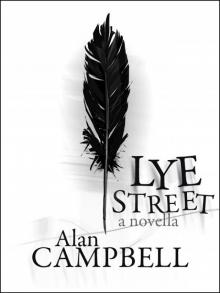 Lye Street
Lye Street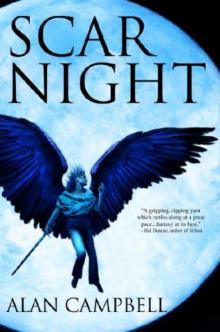 Scar Night; Book One of the Deepgate Codex Trilogy
Scar Night; Book One of the Deepgate Codex Trilogy Art of Hunting
Art of Hunting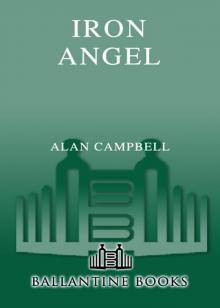 Iron Angel
Iron Angel Gravedigger 01 - Sea Of Ghosts
Gravedigger 01 - Sea Of Ghosts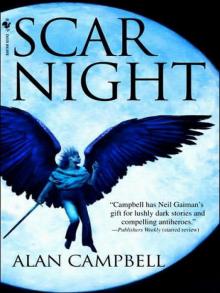 Scar Night
Scar Night The Art of Hunting
The Art of Hunting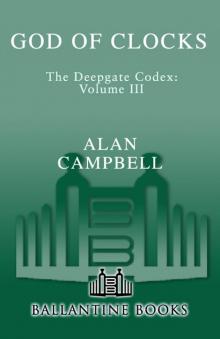 God of Clocks
God of Clocks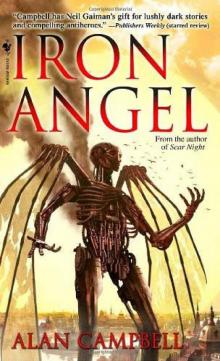 Iron Angel dc-2
Iron Angel dc-2